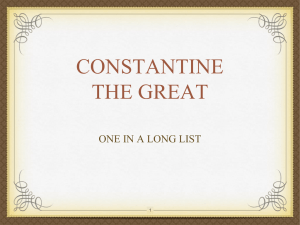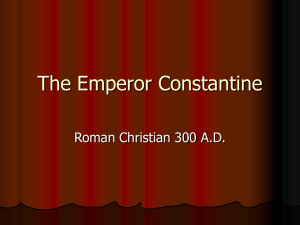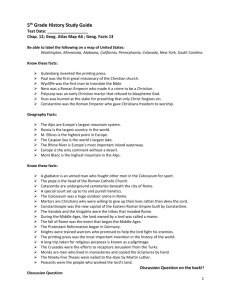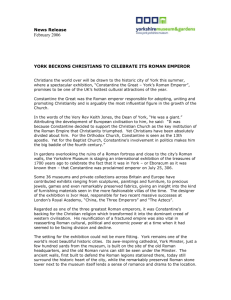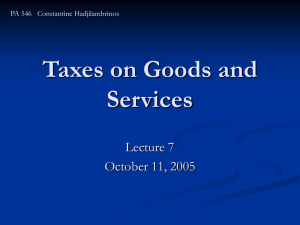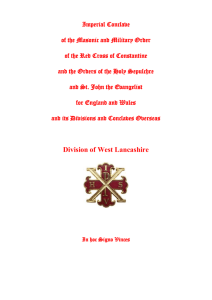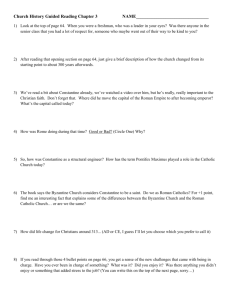If You Cannot Beat Them, Join Them! (Emperor Constantine)
advertisement
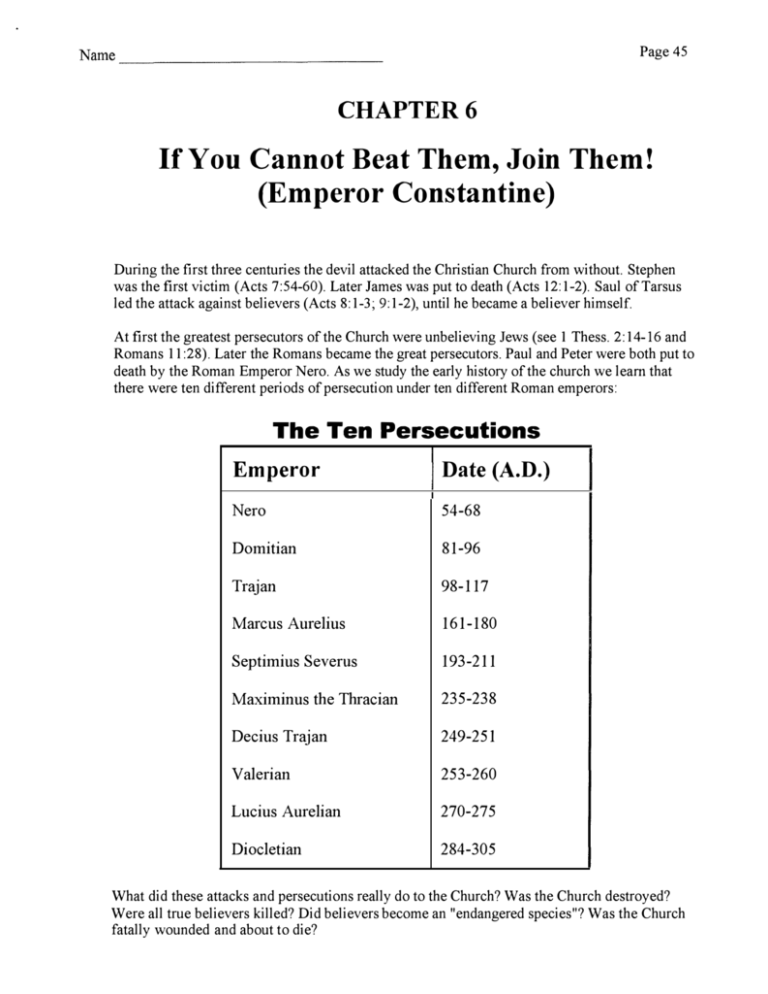
Name Page 45 _____________________________ CHAPTER6 If You Cannot Beat Them, Join Them! (Emperor Constantine) During the first three centuries the devil attacked the Christian Church from without. Stephen was the first victim (Acts 7:54-60). Later James was put to death (Acts 12: 1-2). Saul of Tarsus led the attack against believers (Acts 8:1-3; 9:1-2), until he became a believer himself. At first the greatest persecutors of the Church were unbelieving Jews (see 1 Thess. 2:14-16 and Romans 11:28). Later the Romans became the great persecutors. Paul and Peter were both put to death by the Roman Emperor Nero. As we study the early history of the church we learn that there were ten different periods of persecution under ten different Roman emperors: The Ten Persecutions Emperor Date (A.D.) Nero 54-68 Domitian 81-96 Trajan 98-117 Marcus Aurelius 161-180 Septimius Severus 193-211 Maximinus the Thracian 235-238 Decius Trajan 249-251 Valerian 253-260 Lucius Aurelian 270-275 Diocletian 284-305 What did these attacks and persecutions really do to the Church? Was the Church destroyed? Were all true believers killed? Did believers become an "endangered species"? Was the Church fatally wounded and about to die? Emperor Constantine Page 46 Actually the very opposite happened. The more the Church was persecuted and attacked, the more it grew and prospered. "The blood of the martyrs became the seed of the church." When Stephen died the Church lost a great warrior, but his death led to the conversion of Saul of Tarsus, and Paul the great apostle accomplished what Stephen never would have been able to do. The martyrs died, but others were saved and took their places. Christianity not only spread but it thrived and prospered. The Church of Jesus Christ could not be exterminated. It survived each and every persecution against it [compare Matthew 16:18--"and the gates of hell (Hades) shall not prevail against it"]. The Church could not be defeated. It came out of every persecution victorious and strong. The devil knew that the Church was surviving and thriving. The Satan-inspired attacks against the Christian Church were unsuccessful. Even men were beginning to realize this. In the year 311 A. D. Galerius (along with his co-emperors, Constantine and Licinius) signed the Edict of Toleration, a law which granted toleration to all religions including Christianity. Galerius was not a fan of the Christians, nor was he a friend. He was a foe of the Christians but he was smart enough to realize that the past persecutions under the Romans had not accomplished anything. The more the believers suffered the more they multiplied. The devil still wanted to destroy the Church, but persecution was not the way to do it. Instead he came up with a much better plan. Instead of attacking the Church from the outside he would corrupt the church and destroy it FROM THE INSIDE. The devil's new strategy was very simple: "IF YOU CAN'T BEAT THEM, JOIN THEM!" Don't fight them, just shake hands with them and JOIN THEIR TEAM! Infiltrate their ranks! Let's see how this strategy worked! The Great Constantine Constantine, born in 272 A.D. , became a Roman Emperor. His life is worthy of careful study because the history of the world and the history of the Christian Church were both greatly affected by this man. Constantine was the first Roman emperor to call himself a Christian. Earlier in his life he had been a worshipper of pagan gods, especially the god of the sun (called Mithra or Apollo). What was it that caused an idolatrous sun-worshipper to later call himself a Christian? This amazing event happened in the year 312 A.D. Constantine, along with thousands of soldiers, was preparing to fight against Maxentius, a man who wanted to be emperor instead of Constantine. The army of Maxentius was three times as large as Constantine's army. O n the day before this great battle took place we are told that Constantine offered some kind of a prayer in which he asked for help and assistance in the coming battle. This would be one of the most important battles in all of history. If Maxentius had won this battle, the history of our world would have been quite different. There is a famous legend or tradition which says that on the day before this great battle Constantine looked up into the heavens and saw a bright cross right above the sun. Evening was approaching, and the sun was beginning to set when he saw this amazing sign. The cross had these words connected to it: "BY THIS (SIGN) CONQUER" Name ------- Page 47 Whether or not Constantine really saw this heavenly sign is very doubtful. He must have seen something because he really seemed to think that the God of the Christians had given him a message just prior to this battle. Some believe that on the night before the battle he had an unusual dream in which he saw some of these things. The next day the two armies met on the field of battle. It was a furious fight but finally the army of Maxentius was completely defeated. Maxentius tried to flee and escape for his life but he ended up being drowned in the Tiber River. After this victory Constantine was convinced that he had been helped by the God of the Christians. From this point on he honored the Christian faith and did what he could to help and protect and promote the Christians. He became the first "Christian" emperor (but whether he ever became a true believer in Christ is another question). The Edict of Milan Constantine did not waste time in trying to help the Christian cause. In the year 313 A.D. Constantine (the emperor in the West) and Licinius (the emperor in the East) signed the EDICT OF MILAN. This important law made Christianity a legal and lawful religion. Christians were no longer outlaws. Christians were no longer enemies of the government. This law provided for full religious freedom for all Roman citizens. Every subject of the Roman empire was now free to choose whatever religion he preferred. He could choose to worship heathen gods or he could choose to worship the true and living God. This edict put a stop to the horrible persecutions against believers. The Empire Becomes "Christianized" Constantine brought about many changes in the empire. Here are some of the good changes which he made: 1. Crucifixion was abolished. 2. Infanticide (the killing of unwanted infants) was abolished. Do we have anything like this in our society today? 3. The practice of slavery was discouraged and many slaves were set free. 4. The gladiatorial games were suppressed (although they were not yet completely eliminated). Constantine tried to help the Christian church in many ways. He chose Christian men as his advisers. He provided many benefits for the clergy (those men who were leaders in the churches, usually called "bishops"). The clergy did not have to pay taxes and they did not have to serve in the military. They were paid good salaries. The life of a Pastor used to be a life of HARDSHIP (see what Paul said to Pastor Timothy in 2 Timothy 2:3) but Constantine was making it a life of luxury. It must have been a very popular thing to be a church leader. Many men would have wanted to apply for such a position with all its benefits. Do you think this is a healthy thing for the church? Does this system give the church the kind of leaders it needs to have? Do you think many of these men would be tempted to serve the church for the wrong reasons? Emperor Constantine Page 48 Constantine also contributed greatly to the building of great church buildings. Magnificent church buildings were erected in Jerusalem, Bethlehem, Constantinople and other places. The churches got bigger and better, greater and grander. But does a great church building mean that the church is great? You may have seen some magnificent and impressive church buildings and cathedrals in some of the cities in our land, but what does God think about these churches and the people who attend them? Is God impressed by a giant building and beautiful architecture, or is He more concerned about the hearts of those people who come to these or any other buildings? Constantine frequently used the word "Catholic" to describe the Church. The word CATHOLIC means UNIVERSAL. Constantine wanted all men everywhere to embrace the Christian faith and he wanted Christians to be united together. He thought that Christianity was the one thing that could unite his empire and make it great. Today we are very familiar with the CATHOLIC CHURCH. It is interesting that many of the Catholic practices and customs and teachings had their beginning around the time of Constantine. Sunday was Constantine who set aside the first day of the week, Sunday, as a sacred day of worship. He wanted to make this day a day of rest and worship. It He was the one who actually gave this day its name. When he made the first day of the week a holiday he called it "the venerable (sacred) day of the sun." He called it SUNDAY. We have already mentioned that Constantine was once a "sun worshipper." Even after he claimed to be a Christian he still seemed to carry these "sun god" ideas with him. For example, one side of his coins had the letters of the name of Christ and the other side had the figure of the sun god. Whether he still honored the sun god or whether he just wanted to please those in his kingdom who worshipped the sun god, we do not know. We do know that the first day of the week was named after the SUN! As true Christians we should remember that it is really SONDAY--the day in which we honor the Son of God. It is the LORD'S DAY! The Seventh Day Adventists and some other groups who do not worship on Sunday tell us that Constantine was the one who gave us SUNDAY. They believe that SUNDAY WORSHIP started with Constantine. This is not true. Constantine was the one who officially made this day a sacred day of worship, but true believers had been worshiping God on the first day of the week long before the time of Constantine. Beginning with that first resurrection Sunday, the Lord Jesus seemed to "train" His disciples to gather together on the first day of the week. On the first resurrection Sunday the Lord appeared to the group of disciples, but Thomas missed this "Sunday Evening Service" (John 20:19-23). According to the Jewish method of time computation (the inclusive method), the Lord appeared to the disciples exactly one week later (verse 26-"after eight days"). On this Name Page 49 ------- Sunday Thomas was in attendance (verses 26-29). It was also on a Sunday that the Holy Spirit came and the church was born (see Acts chapter 2 and compare Leviticus 23:15-16). The day of Pentecost occurred seven weeks after the Lord's resurrection. The disciples were getting into the habit of gathering together on the first day of the week in celebration of the day when Christ victoriously arose from the dead! See our study, The Sabbath and The Lord's Day. The Capital of the Empire is Moved Constantine also made history by moving the capital of the empire from Rome to a new location. The new location was Byzantium which was located on the Bosporus (where the Black Sea and the Mediterranean Sea are connected). This key city actually divides the East from the West and divides Europe from Asia. He named his city NEW ROME and later it came to be called Constantinople (named after the emperor himself). Constantine in many ways tried to make NEW ROME a Christian city. He built a great church there. No gladiatorial shows were allowed, etc. Constantine's Baptism Was Constantine a real Christian? Many doubt that he was. One reason that his faith is suspect is that he was never baptized until his closing days. At the age of 65 when he finally sensed death approaching he was finally baptized. He died a few days later. He thought that by being baptized his sins would be forgiven. Did he have a correct understanding of baptism? [See our study, Does Water Baptism Save?] What about you? Have you been baptized? What is holding you back? See our study entitled, Baptism and Communion. Also there are many who think that Constantine enjoyed the pleasures of this world and he did not want to let them go until he knew his life was almost gone. Only then would he try to get right with God. Do people take this attitude today? "I'll enjoy my life and live in sin but someday I'll get saved. I'll live it up now but someday I'll get right with God." Many who plan to repent at 11:00 p.m. die at 10:30 p.m. Constantine was baptized by a man named Eusebius. This man was a false teacher who believed many of the things that Jehovah's Witnesses believe today. For example, this man believed that Christ was a CREATURE created by God. What do true Christians believe about Christ (see John 1:1-3)? The Church Becomes Corrupted There is a great danger whenever the church becomes POPULAR! In the days of Constantine it was no longer a shame to be a Christian; it was an honor. It was to your advantage to become a Christian. It was the fashionable thing to do. After all, everyone was doing it and the government put its blessing upon it. [Note: During the years that Jimmy Carter was President-1976 to 1980-it became very fashionable to say that you were BORN AGAIN. Many people started saying they were born again, including many who did not even understand what the new Emperor Constantine Page 50 birth really means.] What was the result of Constantine's new approach to Christianity? Since being a Christian was the popular thing to do, MANY JOINED THE BANDWAGO N! Thousands of heathen joined the church! Suddenly it seemed like the whole world was crowding into the church. Many of these people were Christians in name only. Can a person "name the name of Christ" but not really be a true Christian (see 2 Timothy 2:19)? __ _ It has been said that in the year 324 twelve thousand men with women and children in proportion, were baptized in Rome, and that the emperor had promised to each convert a white garment and twenty pieces of gold. This report may be somewhat exaggerated, but this is the kind of thing that was happening. Even today we have many churches who try to use gimmicks to get people saved: "If you come to Sunday School you will get a free ice cream cone and a stuffed animal" etc. This type of thing started way back in the days of Constantine! Thousands of unsaved pagans became baptized and started calling themselves "Christians." Did water baptism make them true Christians? The church gained in QUANTITY but it lost in QUALITY. There was a massive growth in numbers but no growth in purity. The church was becoming more and more worldly and corrupt. The host of hypocrites and pretenders that was entering the church was multiplying beyond control. In earlier years the church stayed pure because it cost something to be a Christian. O ften it meant suffering and persecution. Believers were not popular with the world. But in Constantine's day it did not cost anything to be a Christian. It was to an advantage to be one! Today in our country it is somewhat easy to be a Christian. There is little persecution and little cost. Suppose the government suddenly made a law that every Christian would lose his head. Do you think you would soon find out who the true Christians really are? As you can well imagine, many heathen customs and practices crept into the church. The pagan images and statues were still honored, but they were given "Christian" names such as Peter or Mary. Artemis (Diana) worship was changed to Mary worship. Also Isis, the Egyptian goddess was easily transformed into Mary. Worshippers of Isis called her "the Great Virgin" and "Mother of the God". Some surviving images oflsis holding the child Horus are in a pose very similar to that of some early Christian Madonnas (showing Mary holding the infant Jesus). Heathen temples were consecrated and changed into churches. Heathen feasts were given Christian names. It was just the same oldpaganism or heathenism under a new name! The church had not conquered the world. THE WORLD HAD CONQUERED THE CHURCH! Paganism had put on new clothes but it was the same old paganism. The Need for Separation What important lesson have we learned from this chapter? Does it pay to compromise? Does it pay to join hands with the world? Did this help or harm the church? Can believers really be at peace with the devil and his system? Remember, Satan never compromises. He is out to attack and destroy the church in any way he can, EVEN BY JOINING IT! Suppose you have a glass of pure milk and also a small cup filled with dirt. What happens if you mix the two? Will the milk make the dirt pure or will the dirt make the milk dirty? As soon as you mix the two you have corrupted and ruined the milk. The only way to have pure milk is to Name ------ Page 51 keep the two separate. Suppose you are a clean believer (saved and justified and washed- I Cor. 6:11) and you play dirty rock music. Will you make the rock music clean or will the music begin to corrupt you? The same is true for a dirty magazine. If you read the magazine and focus your mind upon it, will you make the magazine clean or will the magazine corrupt your mind, resulting in impure thought? Separation is the only answer. "Touch not the unclean thing" (2 Cor. 6: 17). Can you think of ways in which the church and the world are joining together today? How is this corrupting and hurting the church? What can be done about it? How is the church compromising with the world today? How do believers compromise with the world today? Do we follow heathen practices and customs and then call them by some nice name? Can I join up with the world and still be a winner with God? What do the following verses tell me about my relationship with the world? 1 John 2:15-17; James 4:4; Rom. 12:2. James 1:27 Emperor Constantine Emperor Constantine Page 52 WAtch your step! In the days of Constantine, Christianity became accepted and was tolerated. Soon it became very popular. Remember, true Christianity has never been popular with the world. Only a very worldly form of Christianity can get along comfortably with Satan's world system. Jesus said to His true followers, "If the world hate you, ye know that it hated me before it hated you. If ye were of the world, the world would love his own: but because ye are not of the world, but I have chosen you out of the world, therefore the world hateth you" (John 15:18-19).
